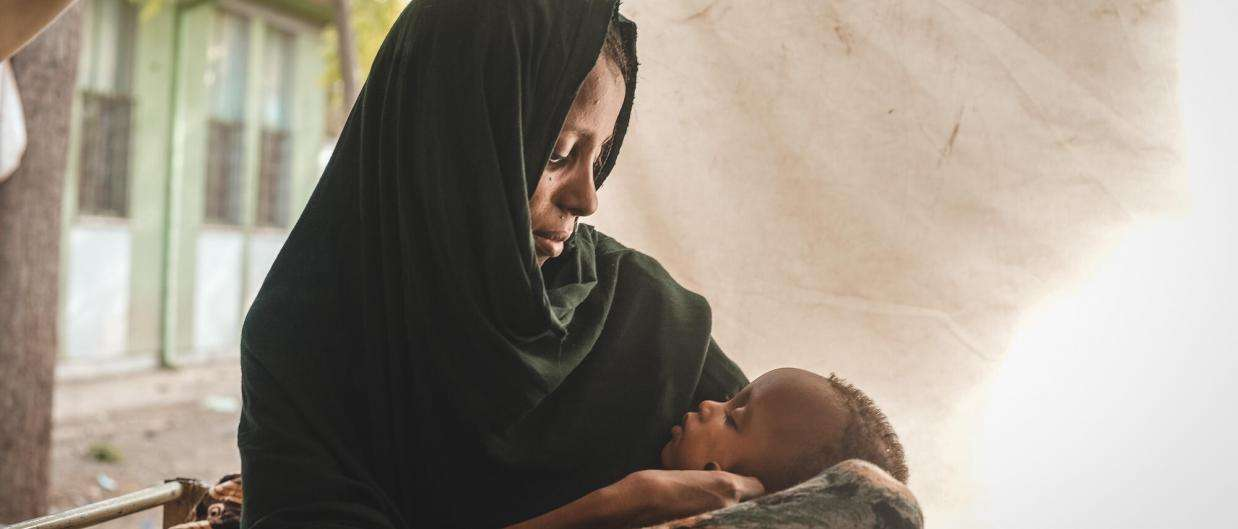Doctors Without Borders/Médecins Sans Frontières (MSF) is witnessing a deadly and escalating nutritional crisis in Ethiopia’s Afar region, requiring a major humanitarian response. Hundreds of thousands of people have fled conflict in Afar and are now facing drought, hunger, and an extreme lack of access to health care, along with the host communities.
“What scares us most at this point is that we are only beginning to see the very tip of the iceberg, and already it is overwhelming,” said Raphael Veicht, MSF emergency coordinator in Addis Ababa. “In Dupti Hospital, which is the only functional referral hospital in all of Afar Region, we are seeing children arrive after incredibly long and difficult journeys, and far too many are dying within 48 hours because they are too sick and too malnourished to have a fighting chance at survival.”
What scares us most at this point is that we are only beginning to see the very tip of the iceberg, and already it is overwhelming.
Raphael Veicht, MSF emergency coordinator in Addis Ababa Since April, MSF has been increasing its support to Dupti Hospital, which serves a population of more than 1.1 million people, including hundreds of thousands of displaced people. This year, the number of severely malnourished children admitted to the facility has already exceeded the same period last year by a factor of three or four. Patient mortality rates are staggeringly high, exceeding 20 percent in some weeks. Thirty-five children have died in the last eight weeks alone, more than two thirds of whom died within 48 hours of admission.
“Clearly, many people in Afar cannot access the very minimum levels of health care, food, and water necessary to sustain human life,” said Veicht. “To even begin to get control of this, a major increase in humanitarian assistance is urgently needed for displaced people and vulnerable host communities, with food security, primary health care, nutrition, and water as key points of focus.”
Only 20 percent of health facilities in the Afar region are reportedly functioning, as many are damaged, destroyed, abandoned or without resources. At Dupti Hospital, more than 80 percent of malnourished children admitted for care have had no previous health care. Patients tell MSF they struggle to access basic needs, leading to increased levels of malnutrition and life-threatening illnesses.
Asiya Salih Mohammed, who brought her one-year-old daughter to Dupti Hospital, said that many people from her community died in the conflict and that she was forced to travel by foot for over a month in search of safety. Now, she has arrived in a displaced persons site which lacks even the most basic provisions.
“The site where we are staying is extremely harsh and uninhabitable,” she said. “There is not enough food to eat, there is no drinking water, the house in which we are staying has no roof, so we have no shade and we’re exposed to the sun.”
The impact of such conditions is apparent among the patients in Dupti Hospital, where nearly two-thirds of malnourished children requiring hospitalization come from displaced families. After MSF started its support for the 14-bed in-patient therapeutic feeding center in Dupti Hospital in April, the ward was quickly overwhelmed with two or more patients per bed. Teams opened 14 additional beds in temporary structures, but these are also fully occupied, and medical staff struggle to provide the level of care children need in this overcrowded facility. Recently, even the regular pediatric ward has become overwhelmed, with the number of patients exceeding beds by a factor of two or more.
“In two days alone, we saw 41 children admitted to the pediatric ward with severe stomach infections because people are forced to drink from muddy puddles,” said Veicht.
The site where we are staying is extremely harsh and uninhabitable... There is not enough food to eat, there is no drinking water.
Asiya Salih Mohammed, displaced woman in Afar region MSF has recently agreed with the Ethiopian Ministry of Health to increase the hospital’s pediatric, in-patient feeding, and emergency department capacity, rapidly construct new buildings and improve water supplies and sanitation. In parallel, MSF plans to open five out-patient feeding programs in areas where they are critically needed, but a much larger humanitarian response is urgently required to avert a larger crisis.
Communities elsewhere in Ethiopia and the wider region warn of catastrophic drought, which is killing off livestock and other necessities for survival, while water, food, and access to health care are often out of reach. In Wardher, in Ethiopia’s Somali region, rains have finally started, but people are still experiencing compounded challenges of food and water insecurity linked to an extended period of drought. MSF recently completed a measles vaccination campaign reaching more than 7,000 children in 50 different locations and has implemented medical surveillance to quickly react to emergency medical needs.

